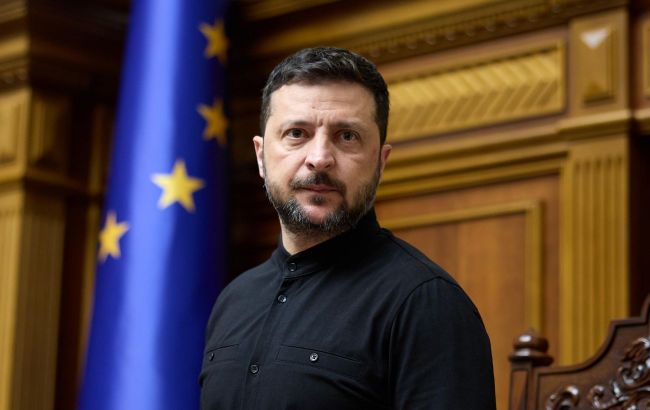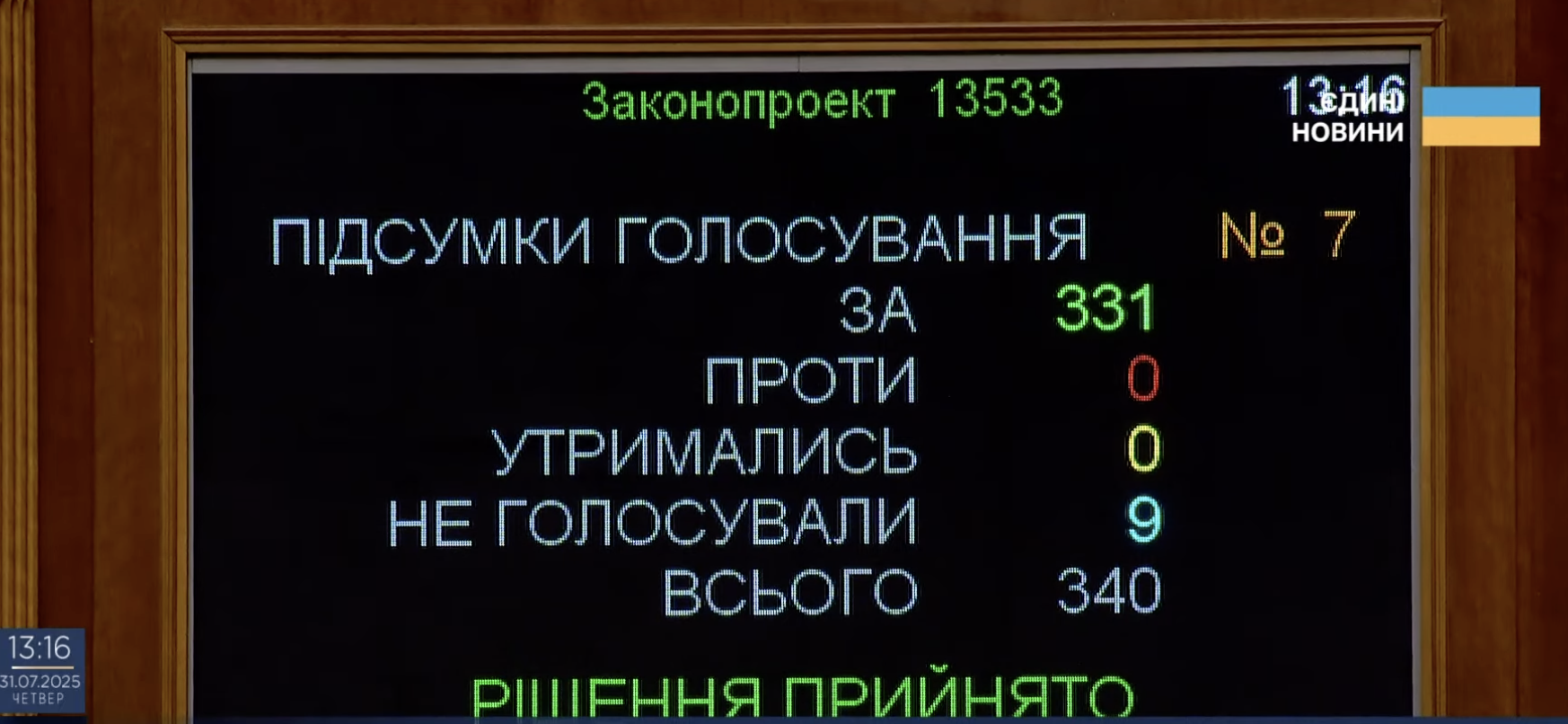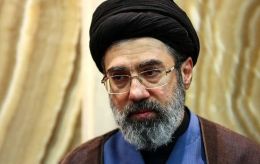Ukrainian Parliament passes law strengthening anti-corruption agencies
 Photo: President of Ukraine Volodymyr Zelenskyy (rada.gov.ua)
Photo: President of Ukraine Volodymyr Zelenskyy (rada.gov.ua)
The Verkhovna Rada supported the presidential bill No. 13533 on restoring the independence of NABU and SAPO. 331 MPs voted in favor.
How MPs voted, the scandal, and the essence of the new law on NABU and SAPO are described in the RBC-Ukraine report below.
How MPs voted
Voting by factions:
- Servant of the People – 214
- European Solidarity – 27
- Fatherland – 4
- Platform for Life and Peace – 17
- For the Future - 11
- Voice - 16
- Trust - 17
- Restoration of Ukraine - 9
- Non-faction - 15
 Photo: overall vote on draft law No. 13533 in the Verkhovna Rada (video screenshot)
Photo: overall vote on draft law No. 13533 in the Verkhovna Rada (video screenshot)
There were no votes against or abstained.
Also, MPs cast 326 votes in favor of the bill being signed immediately. The bill must be signed by the Speaker of the Verkhovna Rada, Ruslan Stefanchuk, and then by President Volodymyr Zelenskyy.
The day before, the Verkhovna Rada's Law Enforcement Committee recommended that the president's draft law on NABU and SAPO be adopted immediately as a basis and as a whole. The document was supported unanimously without any changes to the text from what was registered.
Background. What was scandalous No. 12414 about?
On July 22, the Verkhovna Rada adopted bill No. 12414, which limits the independence of the National Anti-Corruption Bureau (NABU) and the Specialized Anti-Corruption Prosecutor's Office (SAPO). The relevant amendments were made before the second reading.
As a result, 263 MPs voted in favor (a minimum of 226 votes is required for a decision to be adopted). The adoption was preceded by attempts to block the podium, remove the speaker, and remove the bill from the agenda, but these attempts were unsuccessful.
On the same day, the status of the document on the Verkhovna Rada website was updated to include the signature of the President of Ukraine. The law came into force on July 23, after its publication in the parliamentary newspaper Holos Ukrainy.
The adoption of this document destroyed the independence of NABU and SAPO and subordinated their activities to the Prosecutor General. After all, No. 12414 contains the following provisions:
- Prosecutor General has access to all NABU cases or the ability to grant such access to any other prosecutor
- Prosecutor General is given the right to issue binding written instructions to NABU detectives and, in case of non-compliance, to change the jurisdiction by transferring the case to other authorities
- Prosecutor General can close an investigation at the request of the defense
- Prosecutor General has the right to resolve disputes over jurisdiction himself
- Prosecutor General can independently sign suspicions against top officials
- Head of the SAPO loses the right to join the group of prosecutors — only the Prosecutor General can decide on this issue.
The vote on No. 12414 took place the day after mass searches were conducted in the buildings of NABU and SAPO: 70 searches were carried out by employees of the Security Service, the State Bureau of Investigations, and the Office of the Prosecutor General.
The Security Service of Ukraine and the Office of the Prosecutor General claimed to have exposed Russian influence within NABU. Some employees were charged with treason, corruption, and illegal cooperation with the Russian Federation, and suspicions were even announced in the case of a traffic accident.
The adoption of this legislative initiative caused a wide resonance. Thousands of people took to the streets in Kyiv and other Ukrainian cities to protest. Participants chanted slogans such as 'Veto the law,' 'Bring back Europe,' 'Shame,' 'Hands off NABU and SAPO,' and others.
In turn, anti-corruption agencies called on MPs not to vote for No. 12414. However, after the law was passed, SAPO head Oleksandr Klymenko said that July 22 could be considered the end of the independence of NABU and SAPO.
NABU Director Semen Kryvonos, on the other hand, pointed out that the legislative initiative was supported in the Rada by those MPs who are “clients” of the anti-corruption agencies. Therefore, according to him, such MPs have a conflict of interest.
As a result, as noted by anti-corruption agencies, the adoption of bill No. 12414 means that the head of the SAPO becomes a nominal figure, and the NABU loses its independence and becomes a division of the Prosecutor General's Office.
Therefore, the anti-corruption infrastructure of Ukraine, built since 2015, will be destroyed, according to NABU and SAPO.
Since the amendments to the law caused a real resonance not only within the country but also beyond its borders (international partners insisted on preserving the independence of NABU and SAPO, the issue threatened the stability of Ukraine's external financing), the President's Office was forced to react.
Independence of SAPO and NABU restored: What draft law No. 13533 provides for
On July 24, three days after signing the controversial law, President Zelenskyy proposed a new draft law No. 13533, effectively canceling the previous one and introducing safeguards to preserve the independence of anti-corruption bodies. At the same time, MPs submitted 6 alternatives to Zelenskyy's bill.
According to the President, his alternative bill will ensure the strength of the rule of law. The head of state submitted No. 13533 to the Rada after consultations with the heads of law enforcement and anti-corruption agencies.
As Deputy Prime Minister and Minister of Digital Transformation, Mykhailo Fedorov, told RBC-Ukraine, a large team from the government, including everyone who coordinates work in this area, was involved in resolving the issue of restoring the powers of NABU and SAPO. The Ministry of Justice team, led by Prime Minister Yulia Svyrydenko, was also involved.
After the presidential bill was submitted, NABU and SAPO, which also participated in the preparation of the text, announced that No. 13533 restores all procedural powers and guarantees of independence of NABU and SAPO and called on the Rada to adopt it as soon as possible. This will prevent threats to criminal proceedings investigated by anti-corruption agencies.
The bill defines the head of the Specialized Anti-Corruption Prosecutor's Office as an independent head of the prosecutor's office for SAPO prosecutors. This guarantees their procedural independence from the Prosecutor General in cases investigated by NABU.
According to the document, the Prosecutor General is prohibited from giving mandatory written instructions to NABU detectives, transferring their cases to other authorities (except in special circumstances during wartime), or interfering in the work of SAPO prosecutors or NABU detectives. The Prosecutor General also cannot change the jurisdiction of NABU cases without the consent of the head of the SAPO.
On the one hand, the document is intended to guarantee the independence of NABU and SAPO. However, there is a nuance. Draft law No. 13533 stipulates that employees of the Bureau and a number of law enforcement agencies with access to state secrets will have to undergo a polygraph test at least once every two years.
NABU explains that it is proposed that the polygraph test be conducted not by the Security Service of Ukraine, but by NABU's Internal Control Department.
"The draft law, which is intended to eliminate threats to the independence of anti-corruption agencies, provides, in particular, for polygraph testing of NABU employees who have access to state secrets. It is proposed that these tests be conducted by the NABU Internal Control Department," the Bureau says.
In general, the use of polygraphs in such cases is an established internal practice of the anti-corruption agency. Employees undergo polygraph tests during official investigations, appointments, and reappointments. Therefore, this nuance with the polygraph at NABU is not considered an innovation, but an instrument of internal integrity.
Against the backdrop of the scandal surrounding NABU and SAPO, representatives of the US and the European Union called on the Ukrainian authorities not to allow the anti-corruption infrastructure to be weakened and stressed the importance of maintaining transparency as one of the main conditions for international support for Ukraine.
European Commissioner for Enlargement Marta Kos criticized the adoption of draft law No. 12414, calling it a serious step backward, while the ambassadors of the G7 countries publicly expressed their concern.
As RBC-Ukraine learned from the European Commission, the next tranche under the EU's Ukraine Facility program will be significantly reduced. And the timing of this payment could be affected by this very anti-corruption scandal.
Moreover, according to Western media reports, the European Commission has warned the Ukrainian side that further pressure on anti-corruption bodies could lead to a complete cessation of EU funding.



